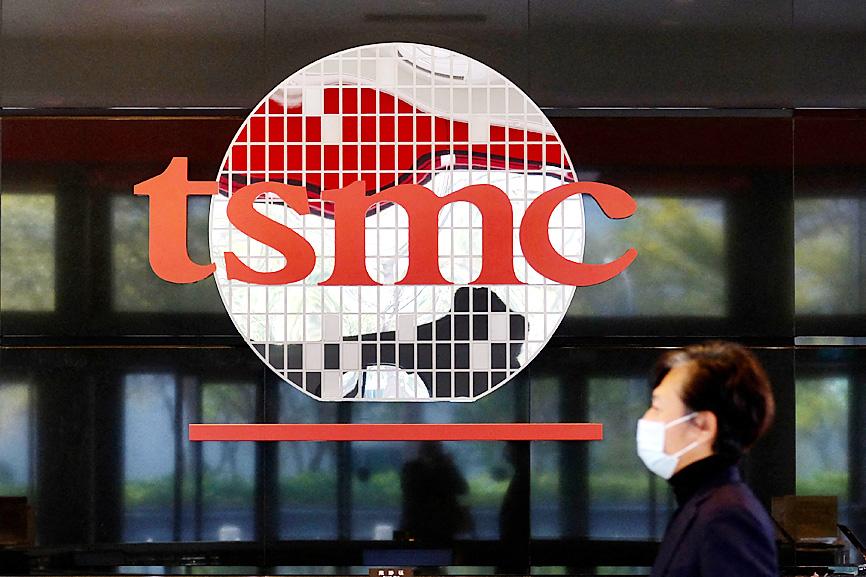Taiwan Semiconductor Manufacturing Co (TSMC, 台積電) plans to invest about US$100 billion to expand capacity and fund research and development (R&D) of advanced technologies in the next three years to keep up with rising demand, it said yesterday.
TSMC unveiled the rare multiyear investment plan to appease customer panic over a global chip shortage.
“We are entering a period of higher growth as the multiyear megatrends of 5G and HPC [high-performance-computing] are expected to fuel strong demand for our semiconductor technologies in the next several years,” TSMC said in a statement.

Photo: Sam Yeh, AFP
In addition, the COVID-19 pandemic has accelerated digitalization, which also drives semiconductor demand, the chipmaker said in the statement.
TSMC made the comments after China-based media Voice reported about the chipmaker’s grand capital investment plan and price adjustments, citing a letter sent by TSMC chief executive officer C. C. Wei (魏哲家) to customers. TSMC declined to comment on pricing.
TSMC has been improving productivity and boosting factory utilization to more than 100 percent over the past 12 months, but has not been able to keep up with demand, Wei said in the letter obtained by the Taipei Times.
The chipmaker is taking more actions to avert future supply crunches, it said.
“TSMC will be building greenfield [new] fabs and expanding existing fabs for both leading-edge and specialty technologies,” Wei said. “We have started hiring thousands of new employees, acquired land and equipment, and started construction of new facilities at multiple sites globally.”
TSMC operates 13 wafer manufacturing factories in Taiwan and China, and is building a new fab in Arizona. Based on the company’s first-phase plan, the US plant would produce 20,000 12-inch wafers per month after it opens in 2024.
TSMC in January budgeted record-high capital expenditure of US$25 billion to US$28 billion for this year, citing technology complexity, technology advancement and high costs of extreme ultraviolet lithography tools.
“Increased capacity will improve supply certainty and help protect complex global supply chains that rely on semiconductors,” Wei said.
In the letter, Wei told customers TSMC would suspend wafer price discounts through the whole of next year, starting on Dec. 31.
“We believe that this modest action is the least disruptive option to supply chains so that TSMC can deliver on our mission of providing leading semiconductor technologies and manufacturing capacity in a sustainable manner,” Wei said.
While most chipmakers have hiked prices by 30 or 40 percent to reflect surging raw material costs and volatile foreign-exchange rates, TSMC has tried to keep prices stable.
Separately, United Microelectronics Corp (UMC, 聯電) yesterday said it would invest more to expand capacity at its factories in Tainan over the next 3 years, in addition to the NT$350 billion (US$12.27 billion) it has spent on capital expenditures over the past decade.
UMC is to spend US$1.5 billion on new facilities and equipment this year, mainly on increasing its 28-nanometer chip capacity, it told investors in January.

Seventy percent of middle and elementary schools now conduct English classes entirely in English, the Ministry of Education said, as it encourages schools nationwide to adopt this practice Minister of Education (MOE) Cheng Ying-yao (鄭英耀) is scheduled to present a report on the government’s bilingual education policy to the Legislative Yuan’s Education and Culture Committee today. The report would outline strategies aimed at expanding access to education, reducing regional disparities and improving talent cultivation. Implementation of bilingual education policies has varied across local governments, occasionally drawing public criticism. For example, some schools have required teachers of non-English subjects to pass English proficiency

‘FORM OF PROTEST’: The German Institute Taipei said it was ‘shocked’ to see Nazi symbolism used in connection with political aims as it condemned the incident Sung Chien-liang (宋建樑), who led efforts to recall Democratic Progressive Party (DPP) Legislator Lee Kun-cheng (李坤城), was released on bail of NT$80,000 yesterday amid an outcry over a Nazi armband he wore to questioning the night before. Sung arrived at the New Taipei City District Prosecutors’ Office for questioning in a recall petition forgery case on Tuesday night wearing a red armband bearing a swastika, carrying a copy of Adolf Hitler’s Mein Kampf and giving a Nazi salute. Sung left the building at 1:15am without the armband and apparently covering the book with a coat. This is a serious international scandal and Chinese

TRADE: The premier pledged safeguards on ‘Made in Taiwan’ labeling, anti-dumping measures and stricter export controls to strengthen its position in trade talks Products labeled “made in Taiwan” must be genuinely made in Taiwan, Premier Cho Jung-tai (卓榮泰) said yesterday, vowing to enforce strict safeguards against “origin laundering” and initiate anti-dumping investigations to prevent China dumping its products in Taiwan. Cho made the remarks in a discussion session with representatives from industries in Kaohsiung. In response to the US government’s recent announcement of “reciprocal” tariffs on its trading partners, President William Lai (賴清德) and Cho last week began a series of consultations with industry leaders nationwide to gather feedback and address concerns. Taiwanese and US officials held a videoconference on Friday evening to discuss the

PERSONAL DATA: The implicated KMT members allegedly compiled their petitions by copying names from party lists without the consent of the people concerned Judicial authorities searched six locations yesterday and questioned six people, including one elderly Chinese Nationalist Party (KMT) member and five KMT Youth League associates, about alleged signature forgery and fraud relating to their recall efforts against two Democratic Progressive Party (DPP) legislators. After launching a probe into alleged signature forgery and related fraud in the KMT’s recall effort, prosecutors received a number of complaints, including about one petition that had 1,748 signatures of voters whose family members said they had already passed away, and also voters who said they did not approve the use of their name, Taipei Deputy Chief Prosecutor